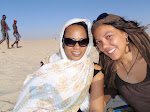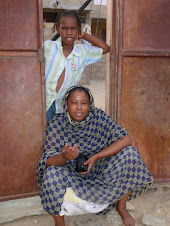Thursday, May 14, 2009
moments in aleg
I wake up and look at my phone to check the time. It’s 3:50. Just minutes before the first prayer call will echo through the town. I pull up my sheet and roll over to fall asleep, but notice that the wind is a little strong. Standing up, I gaze at the quiet town below from my rooftop. Squinting into the distance I see what I dreaded. Sandstorm. A dark blanket of dirt is descending upon us. Sighing I fold up my foam mattress and blanket and make my way down the stairs. Fatou and Dedehi’s family are gathering up their things as well, and we all make the exodus inside. Our mats are laid out in the verandah in a row, we close the doors and sleepily rub our eyes. The sandstorm makes way for the rain and one of the kids stands up and opens the door, letting the humid wind cool the house that is a sauna. “It’s so hot!” Dedehi grumbles. “Tomorrow is going to be bad.” Fatou adds. At this time we are a house of women and children (the father, Ahmedou is in Nouakchott) so we all strip down to minimal clothing and wish for a cool breeze. There we lay, a row of cultural diversity, our completely different pasts leading us to this sweaty moment of solidarity. I close my eyes and fall asleep to the sounds of rhythmic breathing surrounding me.
I walk down the street and greet a woman selling vegetables outside a boutique. A customer squats next to her checking out her supply. A child sitting next to her sees me walk by and calls “Nassaraniya!”, trying her hardest to get my attention. I mentally roll my eyes and ignore it. It’s a way to get foreigners attention, calling out “Hey Christian!” or something along those lines. I hear her mom hush her and say “Hey… her name is Jamila.” I secretly smile, happy that she knows my local name. “What is her name?” Asks the child. “Jamila.” She responds. “Hey Jamila!” She calls out. I turn and wave to them, and they smile at me and wave back. I feel the warmth of familiarity settling into my chest. I take pride in the fact that the people of Aleg are accepting me as a person with a name, rather than just a foreigner.
My classroom is buzzing with activity. I have borrowed books from the Girls Mentoring Center and I’m having my students work on an assignment where they have to find the answers to various questions in the books. I am walking around the classroom answering the endless questions. “Teacher, Teacher! What is “location?”, “Teacher! I don’t understand question 4.”, “Teacher, Teacher! Is this good?”. I make my way to one of my students, Aziza, and when she asks me her question I look at her and say “Are you serious?”. It’s a questions I just spent 5 minutes explaining to them and don’t want to go over it again. “Yes teacher, I don’t understand…” She says with a sly smile. The student next to her giggles and I look at them both, realizing mischief is at hand. The student slowly points to Aziza’s head and I look down, noticing immediately that my sunglasses are on her head. “Hey!” I say, grabbing them and putting them on my own head. “Teacher you dropped them.” Aziza tells me. I laugh and tell her I didn’t even notice they were gone. I continue class with a lighter step, enjoying Aziza’s silly joke.
“I’m going to buy meat.” Dedehi announces. “Can you stay with Siyad?” I look up from my stool, where I sit scrubbing my clothes in buckets – today is laundry day. “Sure.” I say looking at Siyad who is sitting on the ground with a piece of bread. Dedehi leaves and we hear the door to our compound shut. Siyad stands and wobbles over to the door, gazing after his mother. “She went to the market.” I tell him. Siyad wanders toward me and offers me the carcass of his bread, which I gladly accept. You see, Siyad and I are a bread eating team. He only likes the inside of bread, and I love the crispy outside, so life is better when we can eat it together. I stuff the crispy baked shell into my mouth and continue washing my clothes. Siyad squats next to me and looks with big bright eyes. “Washing clothes – can you say it? Yiqsil Labass.” I prompt him in Hassaniya. “Caaaa.” He responds. He is just starting to make attempts at talking, and his words usually involve one consonant and a few syllables. He picks up some of my clothes and mimics my movements. I laugh at his actions and silently thank God that he is o.k. Just weeks before Siyad was pounds lighter and could only stare at me with dim lit eyes. He had some sort of stomach issue, maybe a worm or virus, and to make it worse he was already malnourished. I remember holding him in my lap and feeling his lightness, seeing the pained look in his mothers eyes as she lifted his boney calf. After many visits to various local doctors and advice from too many people to count, Siyad slowly started to regain his health. He now gets powdered vitamins snuck into his system by a clever mother and a can of milk. He is back at a more decent weight (still tiny though) and jabbering more than before. It was interesting to see how sickness is dealt with in Mauritania – and I witnessed some intense ceremonies by traditional healers, struggles with money and new discoveries about local remedies. Siyad now has a green string tied around his waist from a man who used the length to count how many Koran verses to recite. He also has a small burn mark on his chest, from a match lit inside a small tea glass sucked onto his skin. Siyad looks at me and gives me his killer smile – “Good job Siyad.” I tell him squishing the water out of a skirt. “Anne Niqsil labass ma’ Siyad.” He looks over and says “Taa.” With a small confident shake of his head.
I walk down the street and greet a woman selling vegetables outside a boutique. A customer squats next to her checking out her supply. A child sitting next to her sees me walk by and calls “Nassaraniya!”, trying her hardest to get my attention. I mentally roll my eyes and ignore it. It’s a way to get foreigners attention, calling out “Hey Christian!” or something along those lines. I hear her mom hush her and say “Hey… her name is Jamila.” I secretly smile, happy that she knows my local name. “What is her name?” Asks the child. “Jamila.” She responds. “Hey Jamila!” She calls out. I turn and wave to them, and they smile at me and wave back. I feel the warmth of familiarity settling into my chest. I take pride in the fact that the people of Aleg are accepting me as a person with a name, rather than just a foreigner.
My classroom is buzzing with activity. I have borrowed books from the Girls Mentoring Center and I’m having my students work on an assignment where they have to find the answers to various questions in the books. I am walking around the classroom answering the endless questions. “Teacher, Teacher! What is “location?”, “Teacher! I don’t understand question 4.”, “Teacher, Teacher! Is this good?”. I make my way to one of my students, Aziza, and when she asks me her question I look at her and say “Are you serious?”. It’s a questions I just spent 5 minutes explaining to them and don’t want to go over it again. “Yes teacher, I don’t understand…” She says with a sly smile. The student next to her giggles and I look at them both, realizing mischief is at hand. The student slowly points to Aziza’s head and I look down, noticing immediately that my sunglasses are on her head. “Hey!” I say, grabbing them and putting them on my own head. “Teacher you dropped them.” Aziza tells me. I laugh and tell her I didn’t even notice they were gone. I continue class with a lighter step, enjoying Aziza’s silly joke.
“I’m going to buy meat.” Dedehi announces. “Can you stay with Siyad?” I look up from my stool, where I sit scrubbing my clothes in buckets – today is laundry day. “Sure.” I say looking at Siyad who is sitting on the ground with a piece of bread. Dedehi leaves and we hear the door to our compound shut. Siyad stands and wobbles over to the door, gazing after his mother. “She went to the market.” I tell him. Siyad wanders toward me and offers me the carcass of his bread, which I gladly accept. You see, Siyad and I are a bread eating team. He only likes the inside of bread, and I love the crispy outside, so life is better when we can eat it together. I stuff the crispy baked shell into my mouth and continue washing my clothes. Siyad squats next to me and looks with big bright eyes. “Washing clothes – can you say it? Yiqsil Labass.” I prompt him in Hassaniya. “Caaaa.” He responds. He is just starting to make attempts at talking, and his words usually involve one consonant and a few syllables. He picks up some of my clothes and mimics my movements. I laugh at his actions and silently thank God that he is o.k. Just weeks before Siyad was pounds lighter and could only stare at me with dim lit eyes. He had some sort of stomach issue, maybe a worm or virus, and to make it worse he was already malnourished. I remember holding him in my lap and feeling his lightness, seeing the pained look in his mothers eyes as she lifted his boney calf. After many visits to various local doctors and advice from too many people to count, Siyad slowly started to regain his health. He now gets powdered vitamins snuck into his system by a clever mother and a can of milk. He is back at a more decent weight (still tiny though) and jabbering more than before. It was interesting to see how sickness is dealt with in Mauritania – and I witnessed some intense ceremonies by traditional healers, struggles with money and new discoveries about local remedies. Siyad now has a green string tied around his waist from a man who used the length to count how many Koran verses to recite. He also has a small burn mark on his chest, from a match lit inside a small tea glass sucked onto his skin. Siyad looks at me and gives me his killer smile – “Good job Siyad.” I tell him squishing the water out of a skirt. “Anne Niqsil labass ma’ Siyad.” He looks over and says “Taa.” With a small confident shake of his head.
Subscribe to:
Comments (Atom)




